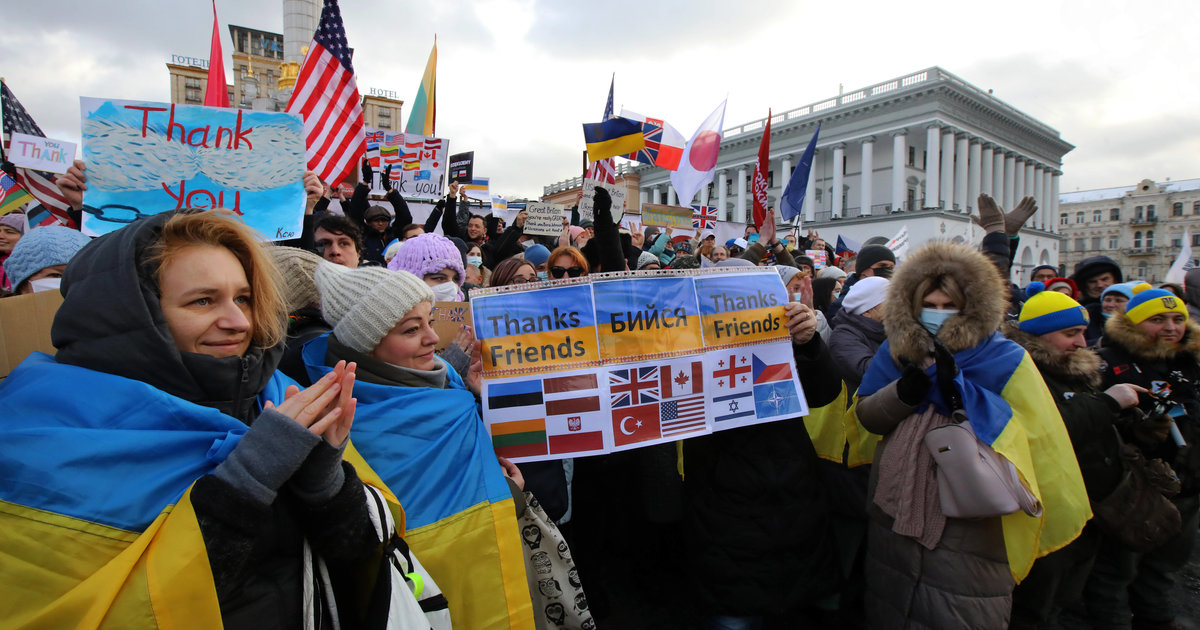The Security Council meets Monday on the Ukrainian crisis at the request of Washington which, with its NATO allies, is stepping up its efforts to dissuade Moscow from invading Ukraine, while preparing new sanctions against Russia.
Faced with the threat of an invasion, Kiev on Sunday called on Russia to withdraw its troops massed along the border between the two countries and to continue dialogue with the West if it “seriously” wants a de-escalation of tensions. The United States and the United Kingdom have meanwhile brandished the threat of new sanctions against Russia. London has indicated that it wants to target Russian interests “which directly interest the Kremlin”.
In Washington, two elected Democrats and Republicans said that Congress was close to an agreement on a bill providing for new economic sanctions against Russia. Among the arsenal of sanctions mentioned, the United Kingdom and the United States plan to target the strategic Nord Stream 2 gas pipeline between Russia and Germany, or even Russian access to transactions in dollars, the main currency in international trade.
Disinformation
Faced with the prospect of these new sanctions, Moscow demanded to be treated on an equal footing by Washington. “We want good, fair, mutually respectful and equal relations with the United States, as with any other country in the world,” said Russian Foreign Minister Sergei Lavrov. Russia “does not want to remain in a position where (its) security is regularly violated,” he continued.
On Monday, Russia will likely try to prevent the 15-member council from holding the meeting, “but the Security Council is united. Our voices are united in asking the Russians to explain themselves,” US Ambassador to the UN Linda Thomas-Greenfield told ABC on Sunday. “We will enter the room ready to listen to them, but we will not be distracted by their propaganda,” she added. “And we’re going to be ready to respond to any misinformation they try to spread during this meeting.”
Russia has been accused since the end of 2021 of having massed up to 100,000 soldiers on the Ukrainian border in preparation for an attack. Moscow denies any plan in this direction, while demanding written guarantees for its security, including the rejection of Ukraine’s accession to NATO and the end of the military reinforcement of the Atlantic Alliance in the East. This key request was rejected by the United States this week in a written response to Moscow. The Kremlin said it is still considering its reaction.
In an interview with CBS, US Undersecretary of State Victoria Nuland said she had detected “signs” that Russia would be interested in a dialogue on the response of the United States and NATO. Secretary of State Antony Blinken and Russian Foreign Minister Sergei Lavrov “will probably talk to each other this week,” she added.
firm position
The chairman of the Senate Foreign Affairs Committee meanwhile took a tough stance, saying it was crucial that Washington send a strong message to President Putin that any aggression against Ukraine would come at a very high cost. “We can’t have a Munich moment again,” Sen. Bob Menendez said on CNN. “Putin will not stop at Ukraine”.
Several Western countries have announced in recent days the dispatch of new contingents to Eastern Europe. British Prime Minister Boris Johnson will propose this week to NATO a deployment of troops to respond to the rise of “Russian hostility” towards Ukraine. An announcement appreciated by NATO Secretary General Jens Stoltenberg and Ukrainian Foreign Minister Dmytro Kouleba, who both hailed British “leadership”.
French Foreign Minister Jean-Yves Le Drian, his German counterpart Annalena Baerbock and Polish Prime Minister Mateusz Morawiecki are expected in Kiev this week. Canadian Defense Minister Anita Anand, whose country provides military assistance to Ukraine, arrived there on Sunday for a two-day visit. She announced the movement of Canadian military troops to western Ukraine and the temporary repatriation of all non-essential employees stationed at her embassy in Kyiv.
–


